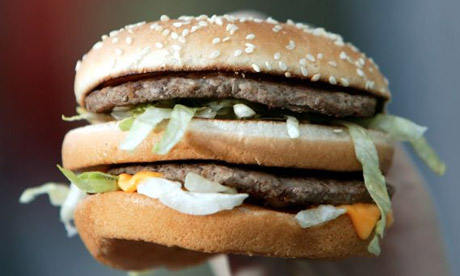
The government has abandoned plans to impose a pre-9pm ban on junk food TV advertising when it unveils its new anti-obesity strategy tomorrow, safeguarding more than £200m a year in TV advertising revenue.
In a major victory for the advertising industry and commercial broadcasters, it is thought that the Department of Health has lost the battle to introduce a pre-watershed ban following a series of discussions with other government departments, notably the culture minister, James Purnell, MediaGuardian.co.uk can reveal.
Many industry observers had expected that the new obesity strategy, to be launched tomorrow by the health secretary, Alan Johnson, and the public health minister, Dawn Primarolo, would drastically extend the TV restrictions Ofcom brought in last year.
Ofcom has stated that such a ban would have a "disproportionate" effect on the industry, costing as much as £211m in TV ad revenue.
But campaign groups are now convinced that they have lost the battle on the pre-watershed ban.
"It sounds as if the advertising and food industries owe the Department for Culture, Media and Sport a large pat on the back," said Richard Watts, the coordinator of the Children's Food Campaign.
"Our understanding is that the Department of Health supported some very tough restrictions on junk food advertising and marketing, but lost the Whitehall battle to keep them in the obesity strategy"
It is thought that the new plan, Healthy Weight, Healthy Lives, will state that the review of Ofcom's existing restrictions will be brought forward to the summer.
Bringing the process forward indicates that the government is perhaps unconvinced by existing restrictions and may use the review to reintroduce the idea of a pre-9pm ban.
It is also understood that the government intends to earmark significant funds to create new social awareness campaigns, including TV advertising, about obesity.
The advertising and broadcasting industry had feared the worst after Johnson and the prime minister, Gordon Brown, made comments last October that seemed to suggest that a pre-9pm ban would be imposed.
Pressure was cranked up in December by health campaigners who renewed calls for a pre-9pm watershed ban on junk food advertising - and "significant restrictions" on non-broadcast marketing - through a private member's bill introduced by Labour MP Nigel Griffiths.
However, a ray of hope for a "collaborative" approach between government and industry was hinted at in a letter by Primarolo to the Advertising Association chief executive, Peta Buscombe.
Buscombe had been moved to send a letter seeking clarification on the government's intentions after becoming alarmed by the comments made by Johnson and Brown.
Earlier this month, the Advertising Standards Authority produced its first compliance report into the content of food and drink ads and found that companies were sticking to the rules.
Of the 759 ads monitored, just six, or 0.8%, were found to breach the advertising codes - but none fell foul of the new food and drink ad restrictions.
In December, Ofcom produced its first research into the effectiveness of the junk food advertising ban around children's programming, with data indicating a 20% reduction in food and drinks ads shown to under-16s.
However, the mostly positive report also found that there had been a 26% increase since 2005 in the number of ads seen by four- to 15-year-olds watching during "adult" airtime on non-terrestrial TV.
· To contact the MediaGuardian newsdesk email editor@mediatheguardian.com or phone 020 7239 9857. For all other inquiries please call the main Guardian switchboard on 020 7278 2332.
· If you are writing a comment for publication, please mark clearly "for publication".

